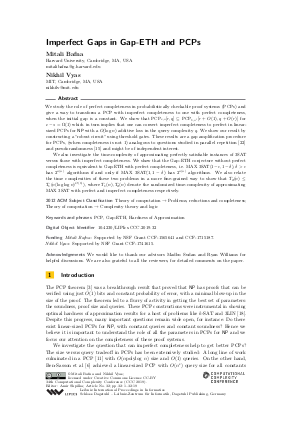@InProceedings{bafna_et_al:LIPIcs.CCC.2019.32,
author = {Bafna, Mitali and Vyas, Nikhil},
title = {{Imperfect Gaps in Gap-ETH and PCPs}},
booktitle = {34th Computational Complexity Conference (CCC 2019)},
pages = {32:1--32:19},
series = {Leibniz International Proceedings in Informatics (LIPIcs)},
ISBN = {978-3-95977-116-0},
ISSN = {1868-8969},
year = {2019},
volume = {137},
editor = {Shpilka, Amir},
publisher = {Schloss Dagstuhl -- Leibniz-Zentrum f{\"u}r Informatik},
address = {Dagstuhl, Germany},
URL = {https://drops.dagstuhl.de/entities/document/10.4230/LIPIcs.CCC.2019.32},
URN = {urn:nbn:de:0030-drops-108545},
doi = {10.4230/LIPIcs.CCC.2019.32},
annote = {Keywords: PCP, Gap-ETH, Hardness of Approximation}
}

 Creative Commons Attribution 3.0 Unported license
Creative Commons Attribution 3.0 Unported license












